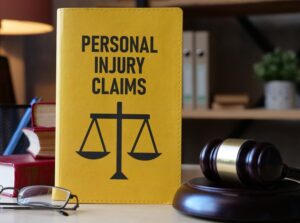After someone else's negligence or wrongdoing injures you, you may recover compensation through a bodily injury claim. But what exactly does a bodily injury claim cover? Let's break it down.
Medical Expenses
One of the biggest and most important components of a bodily injury claim is compensation for medical bills. This includes all health care costs related to your injury. Medical expenses can make up a huge part of the overall claim value. This is especially true if serious injuries required emergency care, hospitalization, surgery, or ongoing treatment. No matter how minor or severe your injuries, you deserve compensation for every medical expense. Medical costs that are typically included in a bodily injury claim cover a wide range, such as:Emergency Room Visits
When injuries first occurred, emergency medical care and transportation via ambulance to the hospital may have been necessary. The fees for emergency room treatment, diagnostic testing like X-rays or MRIs, medication administered, and other emergency services should all be calculated into your claim.Hospital Stays
If you were admitted to the hospital for inpatient care related to your injuries, you would be charged for the room, meals, around-the-clock care from medical staff, and any procedures or surgeries that took place during your hospitalization every day. These costs can become astronomical, but you shouldn't have to pay out-of-pocket.Surgeries and Medical Procedures
Depending on the type and extent of your injuries, you may have required major surgeries, minor procedures, or outpatient treatments as part of your care. The surgeon, anesthesiologist, and operating room costs should be documented. This includes medical equipment used, nursing staff, and any procedures like setting broken bones, repairing herniated discs, or caring for internal injuries.Doctor Appointments and Follow-Up Care
After you left the hospital, you likely had to attend many follow-up appointments with your treating doctors. They checked your recovery, changed dressings, did more tests, gave medication, and provided other care for your injuries. The charges for all health professionals involved in your treatment, from your primary doctor to specialists, physical therapists, and others, should be included.Medications
Treatment for your injuries most likely involved prescription medication, either while you were hospitalized or prescribed through your pharmacy once you were discharged. Costs for painkillers, muscle relaxants, antibiotics, or any other drugs needed to stabilize your condition should be covered.Assistive Medical Equipment
Injuries impacting mobility may require durable medical equipment for recovery. This includes crutches, wheelchairs, walkers, and more. You might also need home care equipment like hospital beds. You can recover the purchase and rental costs for these specialized supplies.Future Medical Treatment
For more severe, permanently disabling injuries, we must account for anticipated future medical costs you may incur over weeks, months, or even years to come. This allows you to claim compensation upfront for the estimated costs of:- Additional surgeries
- Physical rehabilitation
- Home health assistance
- Medical equipment
- Prescription drugs
- Any other long-term care required to manage your injuries
Lost Income
If your injury caused you to miss work, you can seek compensation for the income you lost out on during your recovery period. This applies to employment income, but also other potential lost income like:- Bonuses and commissions
- Income from self-employment
- Income from contract or freelance work
Future Lost Income
In severe injury cases, your ability to work and earn income long-term may be impacted. You may then claim compensation for future lost wages and reduced earning capacity over your remaining career.Pain and Suffering
 Most economic damages in a bodily injury claim, like medical bills and lost wages, can be calculated exactly. But, putting a dollar figure on the huge toll of your injuries is far harder. The pain and suffering you endured because of your injuries deserve to be compensated.
Pain and suffering damages in a bodily injury case aim to account for numerous non-economic factors, including:
Most economic damages in a bodily injury claim, like medical bills and lost wages, can be calculated exactly. But, putting a dollar figure on the huge toll of your injuries is far harder. The pain and suffering you endured because of your injuries deserve to be compensated.
Pain and suffering damages in a bodily injury case aim to account for numerous non-economic factors, including:
Physical Pain and Discomfort
From the moment injuries occur until full recovery (or reaching maximum improvement for permanent conditions), you likely experienced varying levels of physical pain. It ranges from intense, agonizing pain after injuries to persistent, chronic pain during rehab. The pain could be from broken or shattered bones, burns, or cuts. It could also be from injuries to organs and tissue. It could also be from injuries to the back and neck. Or it could be from other medical conditions caused by the incident.Mental and Emotional Distress
Severe physical injuries can also take an immense mental and emotional toll beyond the physical challenges. The mental pain from your trauma, the disruption to your life, and the anxiety over your recovery all count as recoverable losses. So does the risk of depression or mental pain from permanent disabilities and other emotional hardships you've faced.Loss of Enjoyment of Life
Severe injury can greatly hurt your ability to do daily activities, chores, hobbies, and other things you loved before. When this happens, you've suffered a compensable loss of enjoyment of life. Simple pleasures and aspects of your lifestyle that able-bodied people might take for granted can become extremely difficult or impossible, depending on the nature of your injuries.Permanent Disability or Disfigurement
For bodily injury victims who suffer catastrophic harms resulting in permanent disabilities, disfigurements, amputations, paralysis, or complete disability, pain and suffering damages take on heightened importance. The physical and emotional losses have permanent and life-changing consequences. These damages aim to provide some compensation for having to endure a permanently diminished state of being.Calculating Pain and Suffering
Because pain and suffering are so subjective and personal, there is no universal formula or multiplier used to calculate appropriate damages. Every claim is evaluated based on its specific details and surrounding circumstances. Factors taken into account generally include:- The type, extent, and severity of your injuries
- The degree and duration of pain endured
- Hardships faced during injury, recovery, and ongoing
- The amount of medical treatment required
- Permanent scarring, disabilities, disfigurement, or effects
- Dysfunction or limitations on daily life activities
- Emotional distress, mental anguish, loss of enjoyment
- Age, lifestyle, career/job responsibilities impacted
- Need for medical care, accommodations, assistance
- The amount of economic damages like medical costs
Other Damages
Medical expenses, lost wages, and pain and suffering tend to make up the core components of a bodily injury claim. However, there are other damages that may also be recoverable depending on the specific circumstances surrounding your injury. These additional losses shouldn't be overlooked. They can amount to significant monetary costs and impact your life. Some common types of supplemental damages include:Home Health Care Costs
For injuries that leave you incapacitated, immobile, or unable to care for yourself for a period of time, you may require in-home nursing care or hired assistance. Whether you need a visiting nurse, home health aide, or live-in attendant, the costs of these services can quickly accumulate during recovery. You can seek reimbursement for home health expenditures in your bodily injury claim.Compensation for Permanent Injuries or Disfigurement
In catastrophic injury cases resulting in permanent disabilities, disfigurements, or loss of limbs/organs, you are entitled to monetary damages that account for your lifelong impairment. While no amount can make up for devastating permanent injuries, this component aims to compensate for your profound losses.Vehicle Repairs or Replacement
If your bodily injury claim occurred due to a vehicular accident, it's likely your car or truck also sustained damage. You can include costs for repairing or replacing your vehicle as part of your overall claim against the at-fault party. Save all repair estimates, bills, and documentation.Damaged Property Claims
Similarly, if any other personal property was damaged or destroyed in the incident that caused your bodily harm, you can seek compensation for repair or replacement costs. This could include items like broken phones, ruined jewelry, damaged laptops, or other electronics in your possession at the time.Loss of Consortium Damages
Serious injuries can devastate your marital relationship. Injuries can prevent you from maintaining the same level of companionship, affection, and intimacy with your spouse. You may file a loss of consortium claim to compensate for the damage to the marital union caused by your injuries.Burial/Funeral Costs
In the tragic event that a bodily injury results in death, certain members of the deceased's family can seek compensation by filing a wrongful death claim. Wrongful death claims account for:- Burial fees
- Cremation
- Funeral expenses
- Related financial losses
Building Your Claim
 Your injuries are the basis for a bodily injury claim. But, you must also prove negligence or liability by the other party. You'll need compelling evidence of the full extent and severity of your injuries. You'll also need clear proof that the incident occurred due to someone else's reckless, careless, or wrongful actions.
To prevail with your bodily injury claim, whether it's negotiating an out-of-court settlement or taking the matter to trial, you must collect thorough documentation demonstrating:
Your injuries are the basis for a bodily injury claim. But, you must also prove negligence or liability by the other party. You'll need compelling evidence of the full extent and severity of your injuries. You'll also need clear proof that the incident occurred due to someone else's reckless, careless, or wrongful actions.
To prevail with your bodily injury claim, whether it's negotiating an out-of-court settlement or taking the matter to trial, you must collect thorough documentation demonstrating:
The Other Party's Negligence or Fault
The most important element is proving the other party owed you a duty of care. You must prove they breached this duty through negligence or wrongdoing. This breach directly caused the incident that led to your injuries. Evidence commonly includes:- Police reports and accident investigations
- Eyewitness testimony and statements
- Photos/videos of the scene and circumstances
- Expert analysis and accident reconstruction
- Citations issued or violations committed
- The other party's own admissions of fault
The Full Nature and Severity of Your Injuries
You'll need extensive medical evidence and documentation detailing your specific injuries, medical treatments received, and the long-term prognosis and effects, such as:- Diagnostic test results like X-rays, MRIs, etc.
- Records from all medical providers involved
- Written reports and opinions from physicians
- Prescribed treatment plans and medication needs
- Documentation of any surgeries or hospitalization
- Photos showing physical injuries, wounds, casts/braces
Documentation of Your Damages and Losses
You have clear evidence of neglect and your injuries. The last step is to thoroughly document all the damages you've had or will have. These include:- Full accounting of medical costs from all providers
- Pay stubs or employer records confirming lost wages
- Receipts/invoices for medical equipment, home care, etc.
- Photos of property damage, like vehicle repairs needed
- Calculation of future anticipated medical needs/lost earnings
- Records demonstrating diminished quality of life and pain/suffering
Work with an Experienced Attorney
Building a strong bodily injury claim is very complex. So, it's wise to get help from a qualified personal injury lawyer. An attorney can:- Evaluate the details of your situation and injuries
- Determine who was at fault and liability
- Advise you on the legal strengths and challenges
- Ensure you meet all requirements and deadlines
- Calculate all qualifying damages you've incurred
- Advocate for a full and fair settlement amount
- Prepare your case and represent you in court if needed
Don't Settle for Less
The insurance companies and involved parties will likely attempt to minimize payouts whenever possible. That's why it's best to avoid going it alone and not settling for any lowball offers. With a personal injury lawyer, you can fight for the compensation you need and deserve. Your rights, your future, and your recovery are too important to jeopardize. After suffering serious injuries, make the wise choice. Consult with a personal injury lawyer.Contact a Personal Injury Lawyer Today

